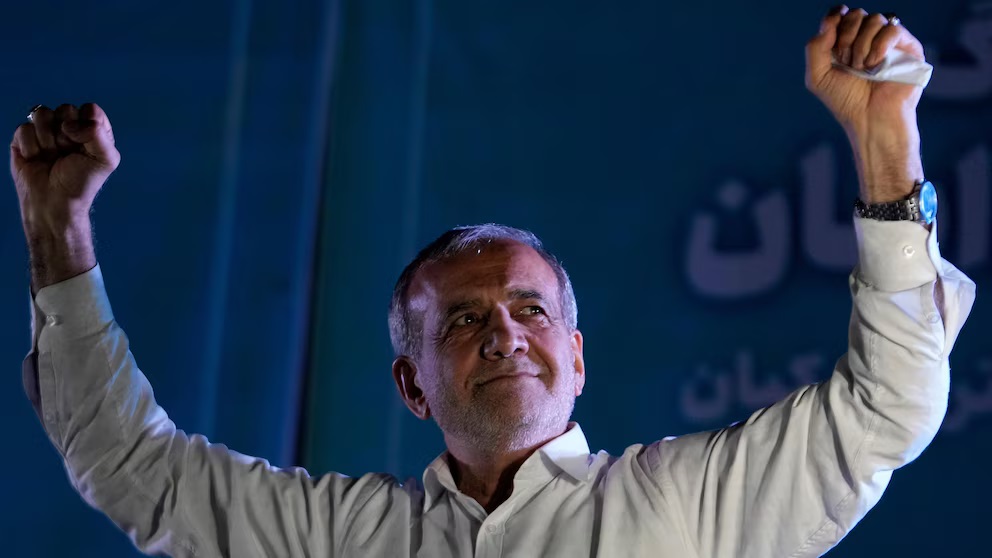- Web
- Feb 20, 2026
Iran 2024 presidential run-off: Pezeshkian leads with 17m votes
-

- Web Desk
- Jul 06, 2024

TEHRAN: Masoud Pezeshkian is currently leading with about 17 million votes in Iran 2024 presidential runoff, while Saeed Jalili secured around 14 million votes, per unofficial reports.
Voter turnout for the election is estimated at around 50 per cent. This is an increase from the initial round’s approximately 40 per cent on June 28. However, international observers have highlighted this election’s turnout as one of the lowest in recent history.
Read more: Iran heads to presidential run-off amid record low turnover
Overseas Iranians from over 95 countries participated enthusiastically in the election, highlighting their engagement despite challenges like voting restrictions in countries such as Canada. Instances of voter harassment abroad led to legal actions by Iranian authorities.
Background
Iran faced a critical moment with the 2024 presidential election, hastily organised after Ebrahim Raisi’s death in a helicopter crash. Vice President Mohammad Mokhber assumed the interim presidency as per Iranian constitutional protocols.
The early presidential elections took place on June 28. Since no candidate secured a majority in the first round, a runoff was held on July 5 between Saeed Jalili and Masoud Pezeshkian.
Voter turnout was notably low at 39.93 per cent, marking the lowest in Iran’s presidential election history, down from 48.4 per cent in 2021.
The elections were conducted across nearly 60,000 voting stations and 90,000 “voting points” nationwide, with an additional 300 stations set up overseas.
Electoral dynamics
Following President Raisi’s death, the Iranian government quickly organised a presidential election with six approved candidates.
After the initial round, citizens and observers awaited the outcome of a runoff between Masoud Pezeshkian and Saeed Jalili, the top candidates. Unofficial reports indicate that Pezeshkian, a reformist lawmaker and former health minister, leading.
Meanwhile Jalili, a hard-line figure known for his role in nuclear negotiations, garnered about 14 million votes.
Pezeshkian campaigned on promises to ease Iran’s mandatory hijab policy, improve relations with the West, and maintain alignment with Iran’s Supreme Leader and Revolutionary Guard.
In contrast, Jalili, known for his conservative stance and anti-Western views, pledged initiatives such as free healthcare and cash payments.
International reactions
The international community is paying close attention to Raisi’s successor as the election’s outcome will shape Iran’s internal policies and external engagements. In particular, regarding nuclear enrichment and regional conflicts involving Iranian-backed groups.
It will also influence Iran’s international relations, including its stance on immigration, internet freedom, and economic reforms, amid global scrutiny.
Iran’s electoral framework
Iran’s electoral system requires direct presidential elections every four years, with the president wielding substantial executive power under the Supreme Leader.
The Guardian Council vets candidates to ensure adherence to religious principles and constitutional fidelity, sparking criticism over the exclusion of female candidates.
If no initial majority is secured, the process may involve multiple rounds, culminating in the Supreme Leader’s endorsement of the elected president.
The 2024 election has faced procedural challenges and international scrutiny.
Candidates profiles
In the lead-up to Iran’s 2024 presidential election, six candidates emerged after vetting by the Guardian Council.
Mohammad Bagher Ghalibaf was Tehran’s former Mayor (2005-2017) and current Speaker of the Islamic Consultative Assembly since 2020. He represented the Progress and Justice Population of Islamic Iran party.
Amir-Hossein Ghazizadeh Hashemi was the Vice President of Iran until withdrawing from the 2024 race. He served in the Islamic Consultative Assembly from 2008 to 2021 with ties to the Islamic Law Party.
Saeed Jalili was the Secretary of the Supreme National Security Council (2007-2013) and Chief Nuclear Negotiator. He ran independently in the 2013 and 2021 presidential elections.
Masoud Pezeshkian is a long-time member of the Islamic Consultative Assembly since 2008 and former Minister of Health and Medical Education (2001-2005). He campaigned independently with a focus on healthcare and education reforms.
Mostafa Pourmohammadi was the Minister of Justice (2013-2017) and Interior (2005-2008). He is affiliated with the Combatant Clergy Association.
Alireza Zakani was the mayor of Tehran and past Assembly member (2004-2021). He withdrew from the 2024 race to counter former President Hassan Rouhani’s policies.
Read more: Iran presidential election run-off: Who is likely to win?
International observers closely monitor Iran’s election runoff between Pezeshkian and Jalili, anticipating its impact on domestic reforms, international relations, and strategic directions.




